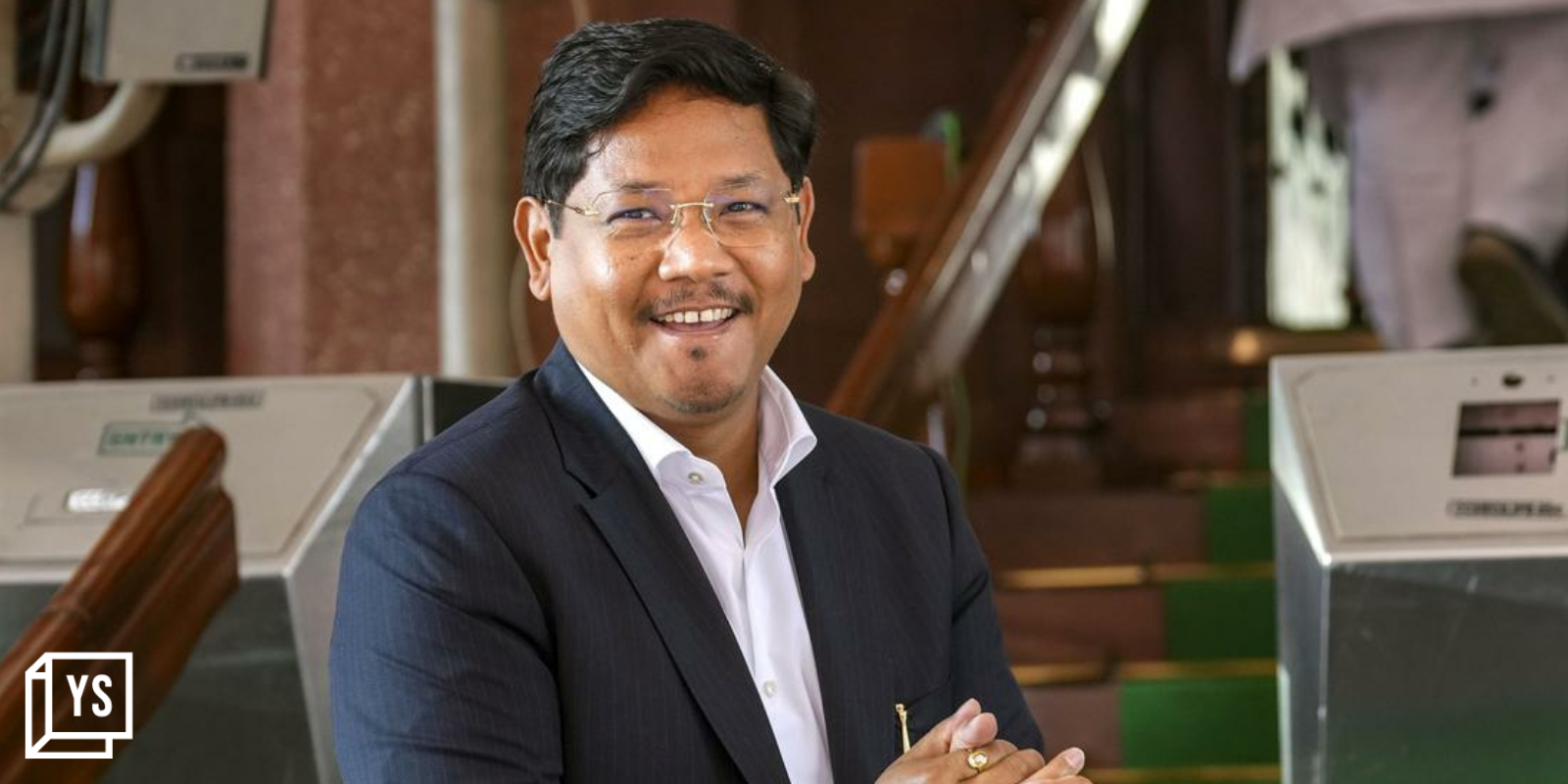Entrepreneurial momentum has picked up in the state; we now have to up the ante: Meghalaya CM Conrad Sangma
In an exclusive conversation with YourStory, Meghalaya Chief Minister, Conrad Sangma, speaks about the state’s multi-pronged approach to encourage entrepreneurship and the role of women and self-help groups in the ecosystem.
Meghalaya Chief Minister Conrad Sangma launched the CM-ELEVATE programme last year with a focus on empowering, engaging, and employing the youth of Meghalaya through the promotion of entrepreneurship. The programme saw more than 29,000 entrepreneurs applying within the first two months of its launch.
The CM-ELEVATE programme encompasses 14 schemes spanning sectors, such as agriculture, animal husbandry, tourism, sports, wellness, and entertainment, catering to the diverse needs of urban and rural communities. The ambitious entrepreneurship programme offers up to 75% subsidy and includes comprehensive assistance to nurture business growth and logistical and administrative support.

Chief Minister of Meghalaya, Conrad Sangma
The programme disbursed about Rs 23 crore to assist 71% of entrepreneurs in the first phase across various sectors; among them, 57% of entrepreneurs were from the agricultural sector while the others were from tourism, sports and wellness, and common facility centres.
Interestingly, the launch of PRIME—Promotion and Incubation of Market Driven Enterprises—in 2019 by the Government of Meghalaya has given a huge fillip to entrepreneurship in the state. Through its four cohorts, PRIME has so far reached 4,395 beneficiaries and incubated 240 entrepreneurs, offering them comprehensive programmes in incubation, mentorship, training, funding access, and networking.
Meghalaya was named the Top Performer State at the National Startup Awards 2022, held as part of the National Startup Day celebrations in January this year. It had secured the position of Best Performer the previous year.
In an exclusive conversation with YourStory, Chief Minister Sangma spoke about the increasing focus on entrepreneurship in the state and encouraging the youth to start up and the role of women entrepreneurs and self-help groups (SHGs).
Edited excerpts:
YourStory (YS): With Meghalaya consistently being recognised for its performance in entrepreneurship, can we now call the state the ‘startup hub of the Northeast’?
Conrad Sangma (CS): We have been recognised by the Government of India for having one of the best ecosystems for startups among small states for two years in the running, which means something good is happening. To say we are right there at the top and have achieved everything would be too premature.
There’s a lot of work that still must be done, but I think we have made a great start. More importantly, the initial inertia and the movement required may be the more difficult part, because you have to make people believe that things can happen.
Once the belief sets in, the momentum and the energy pick up. I feel the hard work has been done, a lot of time has been spent in convincing. The momentum is there, and now we have to really up the ante, take it forward, and achieve bigger heights in the future.
YS: Women make up 60% of entrepreneurs in the state, which is a sizeable number. The state also boasts a matrilineal society. Does Meghalaya have specific schemes to encourage women into entrepreneurship?
CS: This sizeable number of women entrepreneurs reflects strongly on the way we are. The entrepreneurship model we follow looks at three different layers. At the top level, we have innovations where the focus is on new products or processes that are tech-oriented. The second is about basic entrepreneurship when you add value to certain products. At the third level, we are looking at entrepreneurship programmes at the grassroots level, small entrepreneurs, and self-help groups that add value.
In the entire process, when it comes to small entrepreneurs and self-help groups, we are seeing a lot of response from rural women. This is good because earlier their income was limited, there were few programmes they could receive funds from, and there was no systematic way of guiding them.
In the past many years, we have combined the self-help group movement with the cooperative society movement, the Mission Mode programmes, and technology improvement. The government invests in processing units and hands the ownership to them.
YS: There are several examples of women entrepreneurs leading the way …
CS: Yes, this multi-pronged approach has seen women take a lot of interest, and hopefully we will see more success stories. If you go towards Jaintia Hills, you must visit Laskein Block where we have 15 women’s SHGs who have been funded for solar-powered turmeric processing units and they are doing exceptionally well.
YS: Do you believe that the significant rise in entrepreneurship in the state, which is also identifying homegrown talent, is encouraging the youth to start up and not look elsewhere for employment?
CS: I hope so, because what people need to realise is that there are a lot of opportunities here. You miss it because you are looking at the other side. I remember my late father had a talk with me when I told him I was planning to study abroad. He told me it’s good but, after completing the course, I must come back. It was a condition that I had to come back and work in Meghalaya.
I am an entrepreneur myself and believe there’s so much that can be done here. And that’s one of the reasons why we have been pushing entrepreneurship and funding in an aggressive manner.
I don’t think there’s any other state which gives a subsidy of up to 75% on large projects; on a three-crore project, two crores have been provided by the government. I do hope that encouraging the youth of the state to start up should be the outcome, and I am seeing that happening.
This will completely turn around the economic scenario. We are focusing on everything— tourism, food processing, music industry, movie making, culture and more. I hope we will see more local companies in these sectors coming up.
YS: What kind of support is Meghalaya expecting from the Indian startup ecosystem, especially the investor community and from successful startups?
CS: The government has a huge role to play in this ecosystem–to provide a platform, policy, and infrastructure for entrepreneurs to move forward. Technology partners and investors are also important. We need investors to come and realise the value of the idea an entrepreneur wants to move forward with. We want experts for knowledge-sharing.
We want people to buy products from our state. So, in many ways, the entire community from all over the country can add value. The good thing is that we are not doing too many things—we are focused on a few areas. Those sectors will have certain important players and if they come in and do even 10-15-20% of their bit, the government is there to support. The entrepreneurs and banks are doing their work, and I’m sure the results will be much bigger.
Edited by Swetha Kannan











